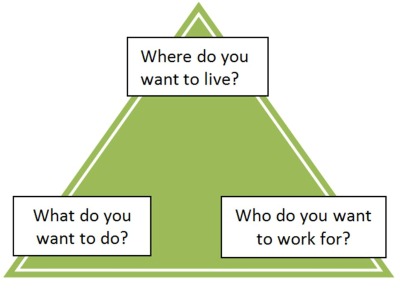The most exciting parts of any new adventure are a) deciding to have one and b) making the plans.
The daunting part for most students embarking on a job or internship search is identifying where to start. Without something concrete to center a search on, it can quickly become overwhelming. Do this. Try to nail down at least one piece of information you know for sure:

If you know all three of these things then you have it easy. Imagine doing a job search when you can say “I want to look for marketing positions in the Portland area with non-profit organizations that deal with environmental issues.”
Knowing that much about what you want simplifies your search for suitable opportunities and your message to networking contacts about what you’re looking for. But what if you know only one piece of that triangle? Here are some strategies to help you move forward:
Where do you want to live? Start With Location
If the only thing you know is where you want to be, then take heart – you have enough to get started! Say you want to move to Boston, like Lauren Bagby ’09. She didn’t know anybody on the east coast but knew she wanted to try living on the other side of the country right after graduation. Here’s her advice about using location as your starting point:
At the time I wasn’t sure exactly what I wanted to do (only what I didn’t want to do), so I could be flexible. I used Idealist.org and Craigslist while I was still on the West Coast to search and apply for jobs. A phone interview is pretty common even if you already live where the job is located, so that’s a good thing to prepare yourself for. If you do well with that, you’ll get an in-person interview. If at all possible, arrange for in-person interviews for when you know you’ll first arrive in town. The first couple weeks will be busy, but worth it.
And if you aren’t able to land a job right away, temp agencies are a great place to start. One of my roommates worked at one for six months and always had a paying job!
If you’re going to focus your search based on a location, particularly if you don’t know anyone in the area, then you will have to make good use of your extended network. Use the ASK Network to find alumni in the area and talk to everyone you know about potential contacts. It will also help if you are flexible and open-minded.
The point of the searching is to get a better idea of the other key points of the triangle: who would you like to work for, and what you would like to do.
Who do you want to work for? Start With an Organization
Whether your certainty is broad (“I want to work in government/non-profit/business) or specific (“healthcare/international relief organizations/graphic design firms”), this knowledge is a good place to start. By default it might also dictate your location, nailing down two sides of the triangle. For example, if you want to work at Nike headquarters, you’ll also be committing to living in Beaverton (or maybe Portland).
Regardless of whether you’re targeting one organization or one type of organization, the next step is the same: find out what roles they typically hire for and identify those that fit your skills and experience. Using the Nike example and taking it a bit more broadly, here’s how a student might start a search based on an interest in “athletic product companies”:

Once you have a list of organizations, the next step is to research their websites. Look for what kind of roles they are currently hiring for and research their general organizational structure to see if there are roles that fit your skills and background. Next, use the ASK network and resources like LinkedIn.com to find connections at that organization who could give you insight into its hiring practices.
What do you want to do? Start With a Position
It would seem on the surface to be easy to start a job search with a specific job title in mind. After all, you can plunk “fundraiser” or “human resources assistant” into a job board’s search tool and pull up all kinds of possibilities, especially if you’re not limiting by location. But what if your field of interest is a little narrower?
When I started a job search fresh out of school I wanted to work as an academic advisor, a role that doesn’t pop up on Monster.com without tons of “financial advisors” clouding the mix. I had to focus my search on the types of organizations that hire academic advisors (i.e. educational institutions) and bypass the big job boards in favor of the niche resources that catered to my field.
As I searched, I found myself naturally weeding out possibilities based on location and organization. By leaning towards the northwest and preferring the positions I found with universities instead of community colleges, I filled in the gaps in my own self-knowledge about what I wanted in a career.
No matter where you start on the triangle, you will eventually fill in all the points. Armed with all that information about yourself, it’s possible to kick a job-search into high gear.
Read the next blog in this series to learn how to use multiple strategies to look for jobs!
© 2011 Career and Employment Services, University of Puget Sound
Photos: Sue Dahlin